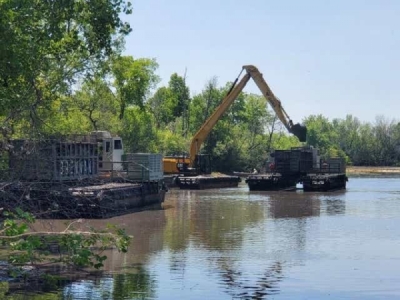
Posted on June 30, 2020
Question: Why are there large machines and digging along the Neenah Slough and into Bridgewood Golf Course?
Answer: The activity you witnessed is the government-ordered removal of contaminated soil and sediment from the Neenah Slough.
The contamination was discovered in late 2008 and subsequently was traced to stormwater runoff from Neenah Foundry, 2121 Brooks Ave. The pollution involves “significant concentrations of several heavy metals including lead, iron, zinc and manganese,” according to an enforcement letter from the Wisconsin Department of Natural Resources.
DNR project manager Kevin McKnight said the metals were in casting spoils from the foundry’s manufacturing process.
“Old foundry sand basically was washed into the sewer,” he said.
Neenah Foundry has hired J.F. Brennan Co. Inc. of La Crosse to carry out the cleanup. The work started last week and is scheduled to be completed by the end of August.
RELATED: Developer plans $12.7 million apartment complex in downtown Neenah
WATCHDOG Q&A: Duke Behnke answers your questions
Karl Dahlen, general counsel for Neenah Foundry, said the remediation plan calls for the dredging of 18,000 to 19,000 cubic yards of sediment. The material will be dewatered and hauled to a Waste Management landfill.
The foundry, as the responsible party for the contamination, is paying for the cleanup. Dahlen declined to say how much it will cost.
“It’s a decent amount of money,” he said. “I prefer not sharing that.”
The contamination is not new. Dahlen said it dates to the early 1980s or before.
Stormwater carrying the metals entered the Neenah Slough through the Byrd Avenue outfall. The area of concern covers about 6 acres downstream of the outfall and abuts D&H Climate Controlled Storage, Jewelers Mutual Insurance Group, Valley Management Inc. and Bridgewood Golf Course.
“It’s a fairly confined area,” Dahlen said. “Metals tend to be heavy. They don’t migrate a lot.”
McKnight said the area has been posted with warning signs for more than a decade.
“It’s a lot of bad stuff,” he said. “High levels of lead. High levels of other metals. That’s why it’s being dredged.”
Watchdog Q&A
Post-Crescent reporter Duke Behnke answers your questions about local government. Send questions to dbehnke@gannett.com or call him at 920-993-7176.





